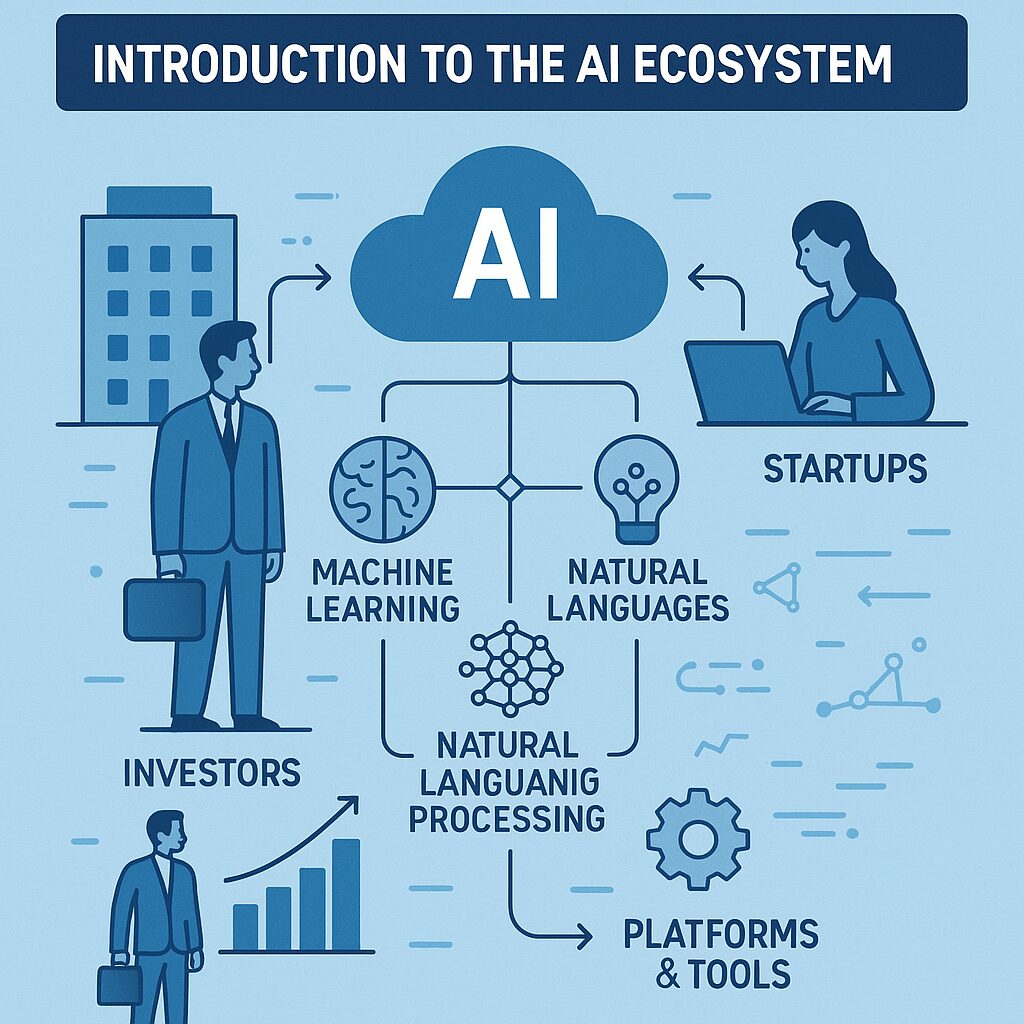Branża sztucznej inteligencji kontynuuje swoją szybką ewolucję, a rok 2025 już teraz zapowiada się na kolejny rok o wysokiej stawce dla startupów w tej przestrzeni. Inwestycje wciąż napływają, ale nie jest to już powódź dla każdej firmy z "AI" w pitch decku. Kapitał jest coraz częściej kierowany do przedsięwzięć z jasno określonym produktem, skalowalną technologią i rzeczywistą wartością. Dla założycieli AI na wczesnym etapie rozwoju pytanie nie dotyczy tylko tego, jak pozyskać finansowanie - chodzi o to, jak wyróżnić się na rynku, który z miesiąca na miesiąc staje się coraz bardziej wyrafinowany.
Osiągnięcia startupu AI - takie jak kamienie milowe finansowania firmy, przełomowe osiągnięcia w rozwoju produktu lub silna pozycja rynkowa - mogą być kluczowym wyróżnikiem w przyciąganiu inwestycji. Źródła finansowania startupów AI obejmują Y Combinator, private equity i innych inwestorów instytucjonalnych, zapewniając wiarygodność i wsparcie finansowe dla rozwoju.
Niniejszy przewodnik przedstawia oczekiwania dzisiejszych Inwestorzy AITrendy kształtujące alokację kapitału oraz strategie, które firmy AI mogą przyjąć, aby uzyskać wsparcie od sponsorów i skalować się w sposób celowy.
Wprowadzenie do ekosystemu sztucznej inteligencji
Ekosystem AI to dynamiczny i wzajemnie powiązany krajobraz, skupiający firmy zajmujące się sztuczną inteligencją, innowacyjne startupy i szeroką gamę najnowocześniejszych technologii. U jego podstaw leży rozwój i wdrażanie zaawansowanych rozwiązań AI - od modeli uczenia maszynowego i głębokiego uczenia się po zaawansowane systemy rozumienia języka naturalnego. Technologie te nie tylko zasilają nowe platformy i narzędzia, ale także napędzają transformację w różnych branżach, od opieki zdrowotnej i finansów po handel detaliczny i logistykę.
Firmy zajmujące się sztuczną inteligencją i startupy odgrywają kluczową rolę w tym ekosystemie, nieustannie przesuwając granice tego, co jest możliwe dzięki ciągłym badaniom, rozwojowi i współpracy. Inwestorzy, przedsiębiorcy i naukowcy pracują ramię w ramię, aby przyspieszyć innowacje, tworząc żyzne środowisko dla powstawania nowych modeli biznesowych i przełomowych rozwiązań. W miarę jak platformy i narzędzia oparte na sztucznej inteligencji stają się coraz bardziej dostępne, firmy każdej wielkości wykorzystują te postępy do usprawnienia operacji, poprawy doświadczeń klientów i odblokowania nowych możliwości rozwoju.
Ponieważ ekosystem sztucznej inteligencji ewoluuje w szybkim tempie, bycie na bieżąco i dostosowywanie się jest niezbędne dla każdej firmy, która chce być liderem w dziedzinie sztucznej inteligencji. Przyjmując najnowsze technologie i wspierając kulturę innowacji, zarówno startupy, jak i firmy o ugruntowanej pozycji mogą znaleźć się w czołówce tej transformacyjnej ery.

Priorytety inwestorów w 2025 r.
Inwestorzy w 2025 roku szukają nie tylko ciekawych technicznie projektów. Stawiają na startupy, które mogą wykazać się wyraźną przewagą strategiczną. Ta przewaga często zaczyna się od danych - a konkretnie od dostępu do ekskluzywnych lub trudnych do powielenia zestawów danych. Niezależnie od tego, czy pochodzą one z unikalnych interakcji z klientami, środowisk specyficznych dla danej domeny czy partnerstw, zastrzeżone dane są często podstawą do obrony. Startupy zajmujące się sztuczną inteligencją często pracują z różnymi typami danych, w tym audio, obrazami i zdjęciami, i mogą wykorzystywać Internet jako źródło danych.
Inną kluczową kwestią jest to, czy startup faktycznie buduje znaczące rozwiązania AI, a nie nakłada funkcje AI na tradycyjne produkty. Zespoły muszą określić, co wyróżnia ich zastosowanie sztucznej inteligencji, niezależnie od tego, czy chodzi o architekturę modelu, metodę wdrażania czy specjalizację domeny. Startupy mogą opracowywać własne oprogramowanie, platformy lub platformy oparte na sztucznej inteligencji, które wykorzystują zaawansowane algorytmy uczenia maszynowego i modele głębokiego uczenia. Generatywna sztuczna inteligencja może tworzyć nowe treści dla użytkowników. Zróżnicowanie produktów może wynikać z zaawansowanych możliwości, takich jak klonowanie głosu, rozpoznawanie twarzy, rozumienie języka naturalnego i agentów AI, a także zastosowań w projektowaniu produktów i tożsamości marki. Niektóre startupy AI pracują nad samojezdnymi pojazdami jako kluczowym obszarem zastosowań.
W centrum uwagi znajduje się również zarządzanie zasobami. Obciążenia związane ze sztuczną inteligencją są wymagające obliczeniowo, a inwestorzy chcą widzieć, że założyciele myślą z wyprzedzeniem o skalowalności i wydajności. Obejmuje to wybory dotyczące infrastruktury chmury, optymalizacji modeli i długoterminowego planowania kosztów obliczeniowych. Optymalizacja oprogramowania i narzędzi może pomóc zaoszczędzić pieniądze.
Ponadto niezbędny jest dobrze zdefiniowany plan wejścia na rynek. Posiadanie produktu to tylko połowa równania; zrozumienie, w jaki sposób dotrze on do odbiorców - poprzez sprzedaż bezpośrednią, integracje, partnerów handlowych lub dostarczanie API - ma kluczowe znaczenie. Fundatorzy chętnie widzą ścieżkę adopcji, która nie opiera się na zasadzie "jeśli to zbudujemy, to oni przyjdą". Wykorzystanie narzędzi AI do reklam, kampanii marketingowych i poprawy jakości obsługi klienta staje się coraz ważniejsze. Narzędzia AI mogą również pomóc startupom w generowaniu nowych pomysłów na funkcje produktu, strategie marketingowe lub zaangażowanie klientów, dzięki czemu proces twórczy jest bardziej wydajny i innowacyjny.
Na koniec, świadomość ryzyka-zwłaszcza wokół regulacji - rośnie. Założyciele powinni być gotowi wyjaśnić, w jaki sposób ich rozwiązanie radzi sobie z prywatnością, ochroną danych i ograniczaniem uprzedzeń. Nie są to już przemyślenia; są to podstawowe pytania podczas badania. Asystenci AI i agenci AI mogą pomóc w zapewnieniu zgodności i dostarczaniu informacji w czasie rzeczywistym.
Silny współzałożyciel i przywództwo firmy są również kluczowymi czynnikami, które inwestorzy biorą pod uwagę przy ocenie zespołu.
Trendy kształtujące środowisko finansowania sztucznej inteligencji
Chociaż apetyt na inwestycje w sztuczną inteligencję pozostaje duży, poprzeczka wzrosła. Czynniki ekonomiczne sprawiły, że wdrażanie kapitału stało się bardziej ostrożne, szczególnie na późniejszych etapach. Mimo to inwestorzy instytucjonalni i korporacyjni nadal aktywnie wspierają firmy, które są zgodne z ich długoterminowymi strategiami, zwłaszcza w obszarach o dużym wpływie, takich jak opieka zdrowotna, automatyzacja przedsiębiorstw, infrastruktura i zgodność z przepisami. Firmy wykorzystujące zaawansowaną technologię sztucznej inteligencji i kompleksowe platformy przyciągają znaczną uwagę zarówno inwestorów instytucjonalnych, jak i private equity.
Stosowana sztuczna inteligencja przyciąga więcej uwagi niż modele spekulacyjne. Inwestorzy poszukują firm, które stosują sztuczną inteligencję do rozwiązywania konkretnych problemów w określonych branżach, a nie uogólnionych narzędzi o niejednoznacznych przypadkach użycia. Jednocześnie popytem cieszą się również firmy rozwiązujące techniczne wyzwania związane ze sztuczną inteligencją, takie jak obsługa modeli, optymalizacja i monitorowanie, zwłaszcza gdy rozwiązania te są dostarczane jako zintegrowane platformy.
Sztuczna inteligencja również ulega decentralizacji. Innowacje nie ograniczają się już do starszych centrów technologicznych, a lokalizacja staje się coraz mniejszą barierą. Współzałożyciele odnoszą sukcesy, budując silne ekosystemy w miastach wschodzących i wykorzystując instytucje akademickie oraz rozproszone zespoły, aby wykorzystać niewykorzystane talenty.
Skład zespołu: Czynnik ludzki stojący za finansowanymi startupami AI
Inwestorzy rutynowo wymieniają zespół założycielski jako najważniejszy element każdej prezentacji. W przypadku startupów AI oznacza to nie tylko rodowód techniczny, ale także spójność międzyfunkcyjną. Silny współzałożyciel i przywództwo firmy mają kluczowe znaczenie dla zbudowania udanego startupu AI. Dobrze zaokrąglony zespół zazwyczaj obejmuje inżynierów uczenia maszynowego, projektantów produktów, specjalistów ds. projektowania produktów, ekspertów dziedzinowych i specjalistów ds. rozwoju biznesu. Takie połączenie zwiększa prawdopodobieństwo, że rozwiązanie będzie zarówno innowacyjne, jak i gotowe do wprowadzenia na rynek.
Ekspertyza w zakresie tożsamości marki może pomóc firmie wyróżnić się, zapewniając, że jej oferta jest zgodna z unikalnym wizerunkiem i wartościami firmy.
Co ważne, podmioty wspierające przykładają większą wagę do przemyślanych kwestii etycznych zespołu. Startupy, które wykazują przywództwo w zakresie odpowiedzialnej sztucznej inteligencji - takie jak przejrzystość w sposobie szkolenia modeli lub zabezpieczenia przed niewłaściwym użyciem - mogą wyróżniać się z tłumu. Cechy te sygnalizują dalekowzroczność i uczciwość, które są cenne dla inwestorów długoterminowych. Korzystanie z asystenta AI może dodatkowo usprawnić przepływ pracy i zwiększyć produktywność zespołu.

Zrozumienie bezpieczeństwa i etyki AI: Niezbędnik dla nowoczesnych startupów
Ponieważ startupy AI nadal przekształcają różne branże, priorytetowe traktowanie bezpieczeństwa i etyki AI nie jest już opcjonalne - jest niezbędne dla zrównoważonego wzrostu i długoterminowego sukcesu. Bezpieczeństwo AI obejmuje projektowanie i rozwijanie systemów AI, które są bezpieczne, niezawodne i przejrzyste, zapewniając, że technologie te minimalizują ryzyko i unikają niezamierzonych szkód dla ludzi lub firm. Oznacza to wdrażanie solidnych zabezpieczeń, monitorowanie nieoczekiwanych zachowań i prowadzenie przejrzystej dokumentacji przez cały proces rozwoju.
Równie ważna jest etyka AI, która zapewnia, że systemy sztucznej inteligencji są zgodne z podstawowymi ludzkimi wartościami, takimi jak uczciwość, odpowiedzialność i poszanowanie prywatności. Dla nowoczesnych startupów integracja bezpieczeństwa i etyki AI na każdym etapie rozwoju ma kluczowe znaczenie - nie tylko w celu zapewnienia zgodności z pojawiającymi się przepisami, ale także w celu budowania zaufania wśród klientów, inwestorów i partnerów. Nieuwzględnienie tych kwestii może prowadzić do utraty reputacji, niepowodzeń finansowych, a nawet kar regulacyjnych.
Wprowadzając odpowiedzialne praktyki AI do swoich działań, startupy mogą wyróżnić się na zatłoczonym rynku, wykazać się przywództwem w branży AI i budować trwałe relacje z klientami z różnych branż. Ostatecznie, zaangażowanie w bezpieczeństwo i etykę AI sygnalizuje, że firma jest nie tylko innowacyjna, ale także godna zaufania i myśląca przyszłościowo.
Wykorzystanie infrastruktury AI dla uzyskania przewagi konkurencyjnej
W szybko zmieniającym się świecie startupów AI, wykorzystanie solidnej infrastruktury AI jest czynnikiem zmieniającym zasady gry. Infrastruktura AI obejmuje podstawowe systemy, narzędzia i technologie, które wspierają rozwój, wdrażanie i zarządzanie zaawansowanymi aplikacjami AI i modelami uczenia maszynowego. Korzystając z platform opartych na chmurze, takich jak Google Cloud, Amazon Web Services lub Microsoft Azure, startupy uzyskują dostęp do skalowalnych zasobów obliczeniowych, ogromnej przestrzeni do przechowywania danych i najnowocześniejszych platform uczenia maszynowego - a wszystko to bez konieczności dużych inwestycji z góry.
Infrastruktura ta jest szczególnie istotna dla startupów pracujących nad dużymi modelami językowymi, generatywną sztuczną inteligencją i innymi rozwiązaniami intensywnie wykorzystującymi dane. Dzięki odpowiedniej infrastrukturze AI zespoły mogą przyspieszyć cykle rozwoju, wydajniej wdrażać rozwiązania oparte na sztucznej inteligencji i obniżyć koszty operacyjne. Pozwala to startupom skupić się na innowacjach - opracowywaniu nowych aplikacji AI, udoskonalaniu modeli uczenia maszynowego i dostarczaniu klientom informacji w czasie rzeczywistym - zamiast grzęznąć w budowaniu i utrzymywaniu własnych systemów zaplecza.
Strategicznie wykorzystując infrastrukturę AI, startupy mogą wspierać szybki wzrost, skalować swoje usługi i pozostać na czele konkurencyjnej branży AI. Zdolność do szybkiego dostosowywania i wdrażania nowych technologii daje startupom znaczną przewagę, umożliwiając im dostarczanie najnowocześniejszych rozwiązań, które spełniają zmieniające się potrzeby zarówno firm, jak i klientów.
Kamienie milowe, które mają znaczenie na każdym etapie finansowania
Na każdym etapie finansowania zmieniają się oczekiwania inwestorów:
- Pre-seed: Inwestorzy oczekują solidnego dowodu słuszności koncepcji, dobrze sformułowanego problemu i wiarygodności technicznej. Zademonstrowanie wczesnego rozwoju platformy, platformy opartej na sztucznej inteligencji lub oprogramowania jest kluczowym kamieniem milowym. Podstawowe demo produktu - takie jak narzędzie generujące obrazy lub dźwięk - oraz nakreślona strategia pozyskiwania danych mogą przejść długą drogę.
- Nasiona: Wczesne sygnały zaangażowania lub użytkowania stają się ważne. Inwestorzy chcą widzieć oznaki, że produkt, platforma lub oprogramowanie może przyciągnąć i zatrzymać użytkowników, a także plan przekształcenia początkowego zainteresowania w powtarzalny silnik wzrostu.
- Seria A: Dowody na dopasowanie produktu do rynku stają się kluczowe. Obejmuje to utrzymanie klientów, pozytywne pętle sprzężenia zwrotnego, skalowalną infrastrukturę i możliwość dostarczania informacji w czasie rzeczywistym za pośrednictwem narzędzia lub platformy. Inwestorzy szukają wiarygodnych wskaźników, że dodatkowy kapitał doprowadzi do wymiernego wzrostu.
- Późniejsze rundy: Będziesz musiał wykazać się stałym wzrostem przychodów, wydajnością operacyjną i planem działania prowadzącym do rentowności. Twoja zdolność do zarządzania większymi zespołami, ekspansji na nowe rynki, realizacji na dużą skalę i wyróżniania się poprzez generowanie nowych treści - takich jak innowacyjne obrazy, audio lub inne media - staje się centralnym punktem.
Tworzenie zwycięskiego biznesplanu dla startupów AI
Atrakcyjny biznesplan jest podstawą każdego udanego startupu AI, przygotowując grunt pod rozwój, inwestycje i pozycję lidera na rynku. W przeciwieństwie do tradycyjnych firm, startupy AI stoją przed wyjątkowymi wyzwaniami i możliwościami, od potrzeby znacznych inwestycji w badania i rozwój po potencjał szybkiej skalowalności i zakłóceń w różnych branżach.
Aby się wyróżnić, startupy AI muszą dogłębnie zrozumieć swój rynek docelowy - identyfikując punkty bólu klientów, analizując konkurencyjny krajobraz i wskazując możliwości innowacji dzięki uczeniu maszynowemu i rozwiązaniom opartym na sztucznej inteligencji. Solidny biznesplan powinien jasno przedstawiać wizję firmy, szczegółowo opisując, w jaki sposób jej wysiłki na rzecz rozwoju sztucznej inteligencji przełożą się na wartościowe produkty lub usługi. Obejmuje to dobrze zdefiniowaną strategię wejścia na rynek, określającą, w jaki sposób startup dotrze do klientów i ich zatrzyma, a także solidny model finansowy, który uwzględnia koszty i przychody związane z rozwojem, wdrażaniem i bieżącym wsparciem sztucznej inteligencji.
Równie ważne jest zbudowanie utalentowanego zespołu. Odnoszące sukcesy startupy AI łączą ekspertów w dziedzinie rozwoju AI, uczenia maszynowego i nauki o danych, wraz z profesjonalistami w dziedzinie rozwoju biznesu, marketingu i sprzedaży. Przedstawiając kompleksowy i realistyczny biznesplan, startupy AI mogą przyciągnąć inwestorów, największe talenty i pierwszych klientów - pozycjonując się jako liderzy w dynamicznej branży AI.
Budowanie silnej sieci: Siła powiązań w pozyskiwaniu funduszy AI
Dla startupów AI budowanie silnej sieci kontaktów jest kluczowym czynnikiem sukcesu w pozyskiwaniu funduszy i rozwoju biznesu. Dobrze skomunikowany założyciel zyskuje dostęp do bezcennych porad, mentoringu i spostrzeżeń branżowych od doświadczonych przedsiębiorców, inwestorów i ekspertów AI. Relacje te mogą otworzyć drzwi do nowych możliwości, od partnerstw strategicznych po wprowadzanie klientów i wspólne projekty rozwojowe.
Startupy mogą poszerzać swoją sieć kontaktów, uczestnicząc w konferencjach branżowych dotyczących sztucznej inteligencji, dołączając do akceleratorów i inkubatorów startupów oraz aktywnie uczestnicząc w społecznościach internetowych skupionych na sztucznej inteligencji i przedsiębiorczości. Zaangażowanie w te sieci nie tylko zwiększa widoczność i wiarygodność, ale także zapewnia praktyczne wsparcie dla rozwoju biznesu i skalowania.
Rozbudowana sieć kontaktów może również zwiększyć atrakcyjność startupu dla inwestorów, którzy często poszukują założycieli z silnymi powiązaniami branżowymi i udokumentowanymi osiągnięciami we współpracy. Inwestując czas w budowanie i pielęgnowanie relacji, startupy AI mogą przyspieszyć pozyskiwanie funduszy, uzyskać wczesny dostęp do możliwości rynkowych i stać się zaufanymi graczami w konkurencyjnej branży AI.
Przygotowanie do due diligence: Porządki w domu
Due diligence jest kluczowym krokiem w pozyskiwaniu funduszy dla startupów AI, zapewniając inwestorom kompleksowy wgląd w kondycję finansową firmy, możliwości techniczne i gotowość operacyjną. Aby wywrzeć dobre wrażenie, startupy muszą upewnić się, że ich dokumentacja finansowa jest dokładna i aktualna, własność intelektualna jest odpowiednio udokumentowana, a infrastruktura techniczna jest solidna i bezpieczna.
Założyciele powinni być gotowi do przedstawienia szczegółowych informacji na temat swojego modelu biznesowego, możliwości rynkowych, pozycji konkurencyjnej i strategii rozwoju. Obejmuje to zademonstrowanie jasnej wizji ich produktów lub usług opartych na sztucznej inteligencji, a także zaprezentowanie siły i struktury ich zespołu zarządzającego oraz ładu korporacyjnego.
Dokładne przygotowanie do due diligence nie tylko buduje zaufanie i wiarygodność wśród inwestorów, ale także sygnalizuje profesjonalizm i dążenie do doskonałości. Porządkując swój dom, startupy AI mogą usprawnić proces inwestycyjny, zmniejszyć potencjalne przeszkodyi pozycjonują się jako wiarygodni partnerzy zarówno dla inwestorów, jak i klientów w szybko rozwijającej się branży sztucznej inteligencji.

Tworzenie atrakcyjnej oferty bez polegania na szumie informacyjnym
Narracja przedstawiana inwestorom powinna być ostra, szczera i poparta dowodami. Zacznij od jasno zdefiniowanego problemu, a następnie przedstaw swoje unikalne rozwiązanie - takie jak platforma, oprogramowanie lub narzędzie oparte na sztucznej inteligencji - oraz sposób, w jaki jest ono dostarczane przy użyciu zaawansowanych narzędzi AI. Zaprezentuj technologię, podkreślając techniczne wyróżniki, takie jak algorytmy uczenia maszynowego, modele głębokiego uczenia i rozumienie języka naturalnego, a także zademonstruj funkcje, takie jak klonowanie głosu, rozpoznawanie twarzy, przetwarzanie dźwięku, generowanie lub edycja obrazów i zdjęć. Podkreśl zdolność swojej platformy do dostarczania spostrzeżeń w czasie rzeczywistym, generowania nowych treści i wykorzystywania Internetu jako źródła danych. Odwołaj się do zaawansowanych aplikacji, w tym agentów AI, asystentów AI i samojezdnych pojazdów, aby zilustrować zakres swojego rozwiązania.
Wyjaśnij, w jaki sposób Twój produkt dociera do użytkowników. Niezależnie od tego, czy Twoimi klientami są deweloperzy, przedsiębiorstwa czy konsumenci, nakreśl, w jaki sposób planujesz ich pozyskać i zatrzymać. Obejmuje to modele cenowe, kanały dystrybucji i cykle informacji zwrotnych. Podkreśl, w jaki sposób Twoja platforma oparta na sztucznej inteligencji może poprawić jakość obsługi klienta, wzmocnić tożsamość marki, zoptymalizować reklamy i prowadzić skuteczniejsze kampanie marketingowe.
Mów otwarcie o ekonomice swojego stosu sztucznej inteligencji. Ile kosztuje uruchomienie modeli? Jakie kroki podjąłeś, aby je zoptymalizować i zaoszczędzić pieniądze? Inwestorzy doceniają założycieli, którzy są transparentni w kwestii zarządzania kosztami.
Na koniec opisz swoją wizję rozwoju i sposób, w jaki nowe finansowanie ją przyspieszy. Pokaż, że myślałeś nie tylko o zbudowaniu czegoś innowacyjnego, ale także czegoś trwałego i skalowalnego.
Przejście od finansowania do skalowalnej realizacji
Pozyskanie finansowania to kamień milowy, a nie meta. Po uzyskaniu finansowania należy skupić się na budowaniu systemów, zespołu i solidnej infrastruktury produktowej - w tym platformy, platformy opartej na sztucznej inteligencji, oprogramowania, narzędzi i narzędzi AI - niezbędnych do długoterminowego rozwoju.
Stale udoskonalaj swój podstawowy produkt poprzez ulepszanie algorytmów uczenia maszynowego, modeli głębokiego uczenia i rozumienia języka naturalnego. Poznaj nowe funkcje, takie jak klonowanie głosu, rozpoznawanie twarzy, przetwarzanie dźwięku, generowanie lub edytowanie obrazów i zdjęć oraz możliwość generowania nowych treści. Rozważ także wykorzystanie Internetu jako źródła danych, aby rozszerzyć możliwości sztucznej inteligencji i zapewnić użytkownikom wgląd w czasie rzeczywistym.
Zbadaj nowe przypadki użycia i sąsiednie rynki, na których Twoje możliwości AI mogą mieć wpływ, takie jak projektowanie produktów, poprawa doświadczenia klienta, wzmocnienie tożsamości marki, optymalizacja reklamy i automatyzacja kampanii marketingowych. Zaawansowane aplikacje, takie jak agenci AI, asystenci AI i samojezdne pojazdy, mogą jeszcze bardziej wyróżnić Twoją ofertę.
Zainwestuj w wewnętrzne narzędzia, które ułatwią monitorowanie, aktualizowanie i zabezpieczanie modeli. Wraz ze wzrostem bazy użytkowników, priorytetem powinna być niezawodność i wydajność - zwłaszcza jeśli produkt obsługuje krytyczne przepływy pracy.
Marketing i przywództwo mogą być również potężnymi dźwigniami. Publicznie dzieląc się spostrzeżeniami, badaniami lub przełomowymi rozwiązaniami technicznymi, pomagasz pozycjonować swoją firmę jako lidera kategorii, przyciągając klientów, partnerów i przyszłych inwestorów.
Podsumowanie: Zdobywanie zaufania na konkurencyjnym rynku sztucznej inteligencji
Aby pozyskać finansowanie w dzisiejszym ekosystemie sztucznej inteligencji, nie wystarczy budować za pomocą odpowiednich haseł. Założyciele muszą zaoferować rzeczywiste zróżnicowanie, przemyślaną realizację i plan długoterminowego tworzenia wartości. Oznacza to posiadanie własnej strategii dotyczącej danych, jasność co do planu wejścia na rynek oraz wykazanie kontroli nad wyzwaniami związanymi z infrastrukturą i zgodnością.
W miarę jak uwaga inwestorów zmienia się z szumu na wpływ, startupy AI, które odniosą sukces, będą tymi, które połączą mocne podstawy z odważną wizją - i udowodnią, że potrafią zrealizować oba te cele.
Dlaczego warto rozważyć skorzystanie z usług doradcy ds. fuzji i przejęć w branży technologicznej?
Pozyskiwanie kapitału to coś więcej niż tylko zapewnienie finansowania - chodzi o strategiczne pozycjonowanie firmy AI pod kątem przyszłego wzrostu lub ewentualnego wyjścia z inwestycji. Doradca ds. fuzji i przejęć w zakresie technologii zapewnia dogłębne zrozumienie warunków rynkowych, trendów wyceny i oczekiwań inwestorów. Niezależnie od tego, czy zamykasz rundę finansowania, czy oceniasz zainteresowanie przejęciem, odpowiedni doradca pomaga w prowadzeniu negocjacji, skutecznym konstruowaniu transakcji i ochronie długoterminowej wartości. Ich zaangażowanie nie tylko wzmacnia pozyskiwanie kapitału dzisiaj, ale kładzie podwaliny pod mądrzejsze decyzje w przyszłości.
O Aventis Advisors
Aventis Advisors jest doradcy M&A koncentrującą się na firmach technologicznych i rozwojowych. Wierzymy, że świat byłby lepszy, gdyby było mniej (ale za to lepszej jakości) transakcji fuzji i przejęć dokonywanych w odpowiednim momencie dla firmy i jej właścicieli. Naszym celem jest dostarczanie uczciwych, opartych na wnikliwej analizie porad, jasno przedstawiających wszystkie opcje dla naszych klientów — w tym tę, która pozwala zachować status quo.
Skontaktuj się z nami aby omówić, ile może być warta Twoja firma i jak zmaksymalizować wycenę.




